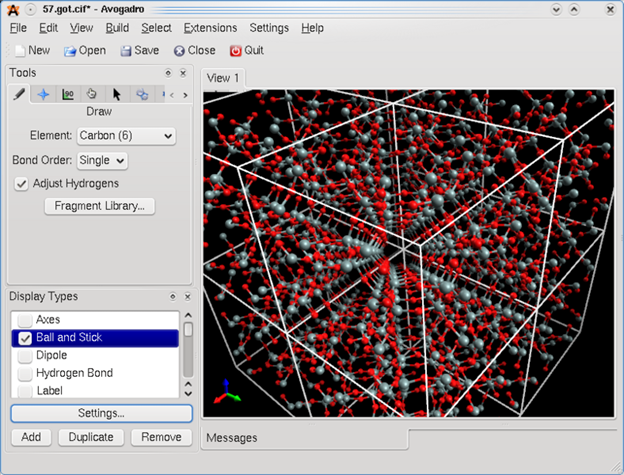The US government (OSTP) has recently issued an RFI on Open Access to data resulting from publicly funded research.
The deadline for responding to the White House RFI on OA to US
federally funded research has been extended to January 12.
There has been an excellent, lengthy, response from Harvard (which inter alia argues for CC-BY and not CC-NC) [See http://mailman.ecs.soton.ac.uk/pipermail/goal/2012-January/000063.html ].
Here I want to applaud the response from Kitware, a company I know remotely (though have never visited). I work closely with Marcus Hanwell, who has developed Avogadro, an Open Source molecular editor ( picture at the end of this mail).
The point here is that Kitware is dedicated to making a successful profitable commercial business out of “Open Source”. They make their software Free/Openly available ( Avogadro is. GNU GPL.). Their flagship is VTK, a graphics toolkit. Their business model is to create added value on top of F/OSS (e.g. by services, consultancy, privately contracted software, etc.).
The world benefits immensely from this approach.
They have responded to the White House RFI in the “Open Source Way”. Reading their excellent submission shows a philosophy similar to what I have outlined – that publicly funded work should be Open **and clearly defined as such**. This means clear licencing of components. They argue for:
- CC-BY for documents (articles/papers)
- OSI-compliant (F/OSS) for source code
- CC0 or Public domain for data (cf. Panton principles)
I strongly recommend you read their submission. Those active in the Open Access movement should realise the essential integrity of the whole scientific research community, where industry is an essential and valued member. NC licences are divisive to contributions such as Kitware’s. [If I published an image such as the zeolite below in a journal under CC-NC Kitware would not be allowed to use it without my explicit permission.]
from Luis Ibanez (Kitware)
“””
At Kitware, we have decided to respond to both RFIs the “Open Source Way“.
We have posted the draft of our responses in the two public documents below:
-
Open Response to RFI on Public Access to Digital Data
-
Open Response to RFI on Public Access to Peer-Reviewed Publications
and we now invite everyone to join us in refining and extending the answers to both RFIs. The documents are open for editing by anyone with the link.
Please join us in improving the feedback that we are providing to OSTP, or if you are satisfied with the current content of the documents, please join us by signing the response at the end of each document. The response will be submitted in the name of the signing parties.
This of course, is not intended to preclude nor diminish any other initiatives for responding to the RFIs. We just want to make sure that we grab this unique opportunity to drive federal policy.
We will close down edits on January 10th, to format the final document responses and submit them to OSTP by January 12th.
Also, watch for an upcoming inSCIght podcast on this topic, open access and federally funded research, which should be available sometime this week.
Happy New Open Access Year !
Luis
“””

The titles for the KitWare links are reversed. Thanks for pointing to these responses. Your blog has been a big help as we formulate our own RFI responses.
Thanks for talking about our efforts here, and I would like to re-iterate that we are actively seeking feedback and comment. We are of course looking at other responses that have been posted publicly, and Luis has worked hard on getting everything in place on our side.
There is an over reaction to this bill. This bill is protecting the rights of publishers to avoid having their copyrighted articles distributed for free by federal law which overwrites their rights. That is, it is a correct bill.
It does not prevent open access articles from being freely distributed. That is, if you want your articles to be freely available, publish them in open access journals, not in subscription journals. This law in no way forbids open access articles from being freely distributed.
My suggestion, if this bill passes, if for the public granting institutions to enact rules that publicly funded research must be published in open access journals (or pay the open access fee to Elsevier). That is, forbid publishing (and thereby transferring copyright) to “regular” journals. This will enhance the quality and reputation of open access journals, therefore it’s a beneficial situation for the future of open access publication.
Conclusion, this bill will end up helping open access publication by shifting publication of publicly funded research from subscription journals to open access journals.
I wonder who “RMS” is? Evidently not Richard M. Stallman.
“This bill is protecting the rights of publishers to avoid having their copyrighted articles distributed for free by federal law which overwrites their rights.”
No. This bill is protecting the “rights” of publishers whose contribution to a published work is maybe 0.2% of the effort to abrogate ownership and total control. Of course, publishers have no such rights; they have merely got used to a historically entrenched system that gives them that privilege, and — quite understandably — want to continue exploiting academics to suck money out of the public purse.
In short: it’s perfectly clear why publishers want this bill. But that is not at all the same thing as their having a right to it.
“My suggestion, if this bill passes, if for the public granting institutions to enact rules that publicly funded research must be published in open access journals.”
I agree.
Uh. I meant “arrogate” of course.